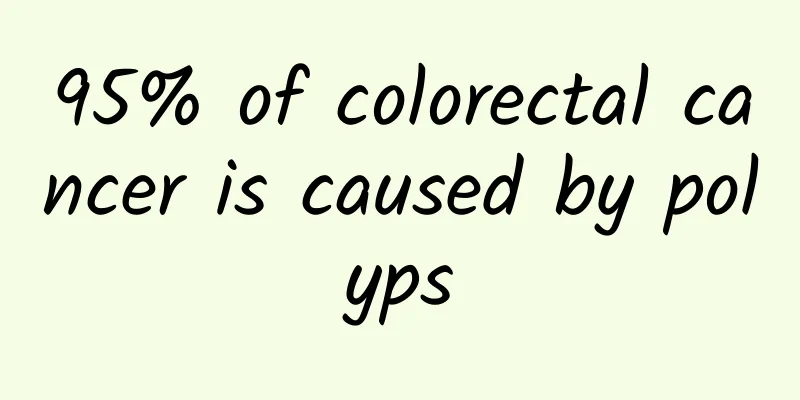95% of colorectal cancer is caused by polyps

|
Most people think that intestinal polyps are just small lumps of flesh that are painless and not a big deal, so they don’t need to worry about them. However, little do people know that this small lump of flesh may cause cancer. 1. 95% of colorectal cancer is caused by polyps In recent years, the incidence of colorectal cancer in my country has gradually increased, and it is showing a trend of replacing lung cancer and becoming the "king of cancer." In fact, 95% of patients' intestinal cancer evolves from colon polyps, and it takes a long time for polyps to turn into cancer. It takes more than ten years for most colorectal polyps to turn into colorectal cancer. In addition, not all polyps will eventually develop into rectal cancer. Therefore, even if we find polyps, we don’t need to be too nervous. As long as we remove them in time, we can effectively prevent rectal cancer. 2. Be careful! Polyps are contagious Recently, a research team from Harvard University and the Karolinska Institute in Sweden conducted an in-depth study and examination of colorectal cancer patients between 1965 and 2017 and found that families with patients with polyps and colorectal cancer have a higher probability of developing cancer than families without colorectal cancer. As long as there is one case of polyps in the family, the probability of the next generation getting rectal cancer will be 43% higher than other people. The more people in the family history, the higher the risk of cancer. In addition to genetic factors, rectal cancer can also be transmitted through our daily diet, lifestyle factors and Helicobacter pylori infection. This is because everyone has the same living and eating habits, which makes it easy for them to suffer from the same disease at the same time. 3. Colonoscopy: Eliminate the chance of polyps becoming cancerous The most effective and direct way to prevent polyps from becoming cancerous is to have a colonoscopy. Colonoscopy is a direct examination of the intestines by inserting an endoscope through the anus. It can not only clearly detect intestinal lesions, but also treat some intestinal lesions. It is one of the safest and most effective methods for diagnosing and treating colorectal diseases. During the examination, if polyps are found, the doctor will make corresponding treatments according to the size of the polyps and decide whether to remove them directly or require hospitalization for surgery. In addition, anyone over the age of 40 who has any of the following symptoms should be listed as a high-risk group for colon cancer. 1. A first-degree relative has a history of colon cancer; 2. Have a history of cancer or intestinal adenoma and polyps; 3. Positive results of colon occult blood test; 4. Those with two or more of the following symptoms: bloody stools with mucus, chronic diarrhea, chronic constipation, chronic appendicitis, etc.; For the above high-risk groups, we must perform a colonoscopy every year to detect and treat the disease early. |
>>: Why is it so easy to rebound after losing weight? The truth is heartbreaking...
Recommend
24-hour emergency contraception
With the development of the times, there are many...
Caesarean section second pregnancy incision itching
When a woman has a cesarean section, scars will a...
Are chestnuts alkaline or acidic? How to choose chestnuts
The acidity and alkalinity of food is an aspect t...
Excessive napping is a sign of dementia? More than 1 hour increases the risk by 40%
A research team from Wuhu Fourth People's Hos...
What exercises can tighten the vagina?
Tightening the vagina is a way to practice the co...
How to get your period quickly?
Menstruation is really a troublesome thing for wo...
Why doesn't the succulent Rainbow Jade turn red? How can I grow the Rainbow Jade so that it will grow vigorously?
As people's living standards improve, more an...
How to treat postpartum cold?
As we all know, women are very weak during the co...
What kind of person is the quality of bamboo like? How to grow bamboo?
Bamboo is born with joints, symbolizing the spiri...
Can pregnant women use skin care products?
Loving beauty is every woman’s nature, but basica...
Can I get eyelash extensions while breastfeeding?
Everyone loves beauty. Many mothers after giving ...
High blood pressure may be caused by kidney disease!
Author: Zuo Li, Chief Physician, Peking Universit...
What is the yellow discharge?
Generally speaking, yellow leucorrhea is a very c...
Picture appreciation of the fifth month fetus
The fifth month of pregnancy is also known as the...









